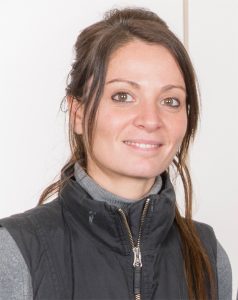Sílvia Mas García |
|
|
Sílvia Mas received the BSc. Degree in Chemistry, MSc degree in Analytical Chemistry and the Ph.D. degree in Environmental Analytical Chemistry from the University of Barcelona in 2002, 2004 and 2012, respectively. She was a Post-Doctoral Fellow at the University of Barcelona and at the University of Montpellier (France), from 2012 to 2014 and from 2014 to 2016 respectively. In September 2016, she joined the group of Signal and Information Processing for Sensing Systems group at IBEC. She published 13 articles, 2 chapter-books and more than 25 abstracts in conferences. Her research interests were always the knowledge and application of very diverse analytical techniques and Chemometrics to handle and interpret analytical information.. |
 |
Group: Signal and information processing for sensing systemsSupervisor: Santiago Marco |
|
Project: Combination of MALDI imaging mass spectrometry with computational data analysis tools to characterize tumor heterogeneity. A multidisciplinary approachThe aim of this work is to propose a new approach to investigate tumor heterogeneity combining MALDI-MSI measurements and computational data analysis tools. This will be applied to identify molecular phenotypes which drive tumor progression and resistance in metastatic colorectal cancer, and correlate these data with clinical characteristics of patients. MALDI-IMS images are highly dimensional 3D datasets that require substantial effort in pre-processing including normalization, baseline correction, and alignment tools. After pre-processing chemometric and machine learning techniques are applied for segmentation, clustering and classification. These datasets are usually constrained by small samples counts stressing the use of optimized validation methods for predictive model optimization and model performance assessment. The project will develop a data analysis workflow for mass spectrometry imaging datasets. This will be applied to identify molecular phenotypes which drive tumor progression and resistance in metastatic colorectal cancer, and correlate these data with clinical characteristics of patients. The project needs experience in analytical chemistry, computational data analysis and colorectal cancer. This project, that require an innovative, inter-disciplinary and multi-disciplinary approach, presents an exceptional opportunity to develop cooperation between the IBEC, other European research centers, universities and hospitals. |
|
